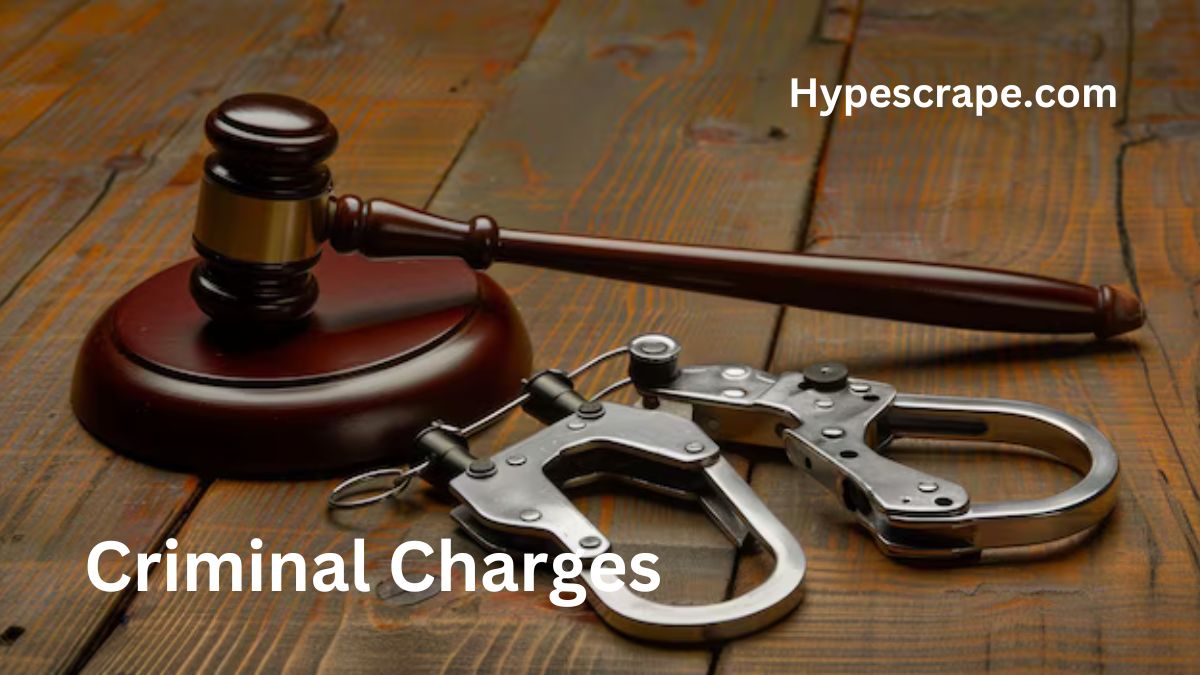CRIMINAL CHARGES
Safeguarding Your Future Facing Criminal Charges with Confidence

Navigating a criminal charge can be one of the most challenging experiences in life. It’s not just about understanding the legal maze but also about safeguarding your future and protecting your rights. Whether you’re facing a minor infraction or a serious allegation, knowing what to do next is crucial. In this blog post, we’ll guide you through the essential steps to take when confronted with a criminal charges, offering insightful tips and actionable advice to help you make informed decisions.
Understanding the gravity of the situation is the first step toward empowerment. Criminal charges can have lasting consequences, affecting your employment, reputation, and personal relationships. Our aim is to equip you with the knowledge and strategies necessary to handle this situation effectively. From knowing your rights to selecting the right legal representation, we cover everything you need to know to protect yourself and your future.
Prepare to gain clarity on the legal process, learn how to communicate effectively, and discover the importance of gathering evidence. You’ll also find out how to manage stress and anxiety during this difficult time. Let’s explore these vital steps to ensure you’re well-prepared to tackle the challenges that lie ahead.
Recognizing the Importance of Legal Representation
Once you’re charged, securing competent legal representation should be your top priority. Having a skilled attorney by your side can make all the difference in navigating the complexities of the legal system. They provide invaluable guidance, helping you understand your rights and the charges against you.
An experienced lawyer can evaluate your case, identify potential defenses, and work to negotiate plea deals if necessary. They also help ensure that your rights are protected throughout the process. This expertise can prevent costly mistakes and increase your chances of a favorable outcome.
Don’t wait too long to seek legal counsel. Delays can jeopardize your case and limit your options. It’s crucial to act swiftly and find a lawyer who specializes in criminal defense, ensuring they have the experience and knowledge to handle your specific situation.
Knowing Your Rights Under the Law
Understanding your rights is fundamental when facing criminal charges. It’s essential to be aware of the legal protections afforded to you, which can prevent self-incrimination and ensure fair treatment. Familiarize yourself with the Miranda Rights, which include the right to remain silent and the right to an attorney.
Exercising your right to remain silent is particularly important. Anything you say can be used against you in court. Therefore, it’s wise to avoid making statements or admissions without your lawyer present. This helps prevent misunderstandings and misinterpretations that could harm your case.
Additionally, knowing your right to a fair trial and due process is crucial. These rights guarantee that you have the opportunity to present your defense and challenge the evidence against you. Understanding these rights empowers you to actively participate in your defense and make informed decisions.
Selecting the Right Attorney for Your Case
Choosing the right attorney is a critical step in protecting your rights. Not all lawyers are created equal, and finding one who specializes in criminal defense is essential. Start by researching potential candidates, looking for those with experience in similar cases and a track record of success.
When meeting with potential attorneys, ask about their experience, approach to handling cases, and familiarity with the charges you’re facing. It’s also important to discuss fees and payment structures to ensure transparency and avoid surprises later on.
Your comfort level with your attorney is equally important. Trust and communication are key components of a successful attorney-client relationship. Choose someone you feel comfortable with, as open communication will be vital throughout the legal process.
Gathering and Preserving Evidence
Collecting and preserving evidence is an essential part of building a strong defense. Documentation and physical evidence can support your claims and discredit opposing arguments. Work closely with your attorney to identify relevant evidence and ensure it’s properly secured.
Begin by creating a detailed record of the incident, including dates, times, locations, and people involved. This information can be crucial in constructing a timeline and identifying potential witnesses. Additionally, photographs, video footage, and other physical evidence should be preserved and shared with your lawyer.
Witness statements can also play a significant role in your defense. If possible, gather contact information from individuals who were present during the incident. Your attorney can then follow up with these witnesses and determine if their testimony could support your case.
Communicating Effectively During Legal Proceedings
Clear and effective communication is crucial throughout the legal process. This includes both your interactions with your attorney and any courtroom appearances. Keeping your lawyer informed of any developments or changes in your situation ensures they can provide the best possible guidance.
When communicating with your attorney, be honest and forthcoming. Share all relevant details, even if they seem insignificant. This information can help your lawyer develop a comprehensive defense strategy tailored to your unique circumstances.
In the courtroom, follow your attorney’s guidance and maintain a respectful demeanor. Listen carefully to questions before answering, and take your time to consider your responses. Effective communication can help you present a credible and persuasive defense.
Managing Stress and Anxiety During the Process
Facing criminal charges can be emotionally draining, causing stress and anxiety that impact your well-being. It’s essential to address these feelings and prioritize self-care during this difficult time. Developing coping strategies can help you stay focused and make sound decisions.
One effective strategy is to maintain a healthy routine. Regular exercise, a balanced diet, and adequate sleep can help alleviate stress and keep your mind clear. Additionally, consider practicing mindfulness or meditation techniques to help manage anxiety and maintain a sense of calm.
Seeking support from friends, family, or mental health professionals can also provide relief. Sharing your concerns with trusted individuals can help you process emotions and gain perspective, ensuring you don’t face this challenge alone.
Understanding the Legal Process and Timeline
Familiarizing yourself with the legal process and anticipated timeline can help set realistic expectations and reduce uncertainty. While each case is unique, having a general understanding of the steps involved can help you prepare for what’s to come.
The process typically begins with an arraignment, where you’ll hear the charges against you and enter a plea. Following this, your attorney will work to gather evidence, negotiate plea deals, or prepare for trial. The duration of your case will depend on various factors, including the complexity of the charges and court schedules.
Throughout this process, your attorney will be your primary guide. They can help you understand each stage, what to expect, and how to respond. Staying informed and engaged will empower you to make strategic decisions and actively participate in your defense.
Exploring Potential Defense Strategies
Developing a robust defense strategy is essential in securing a favorable outcome. Your attorney will evaluate the evidence, identify weaknesses in the prosecution’s case, and explore potential defenses. This may involve challenging the credibility of witnesses, questioning the legality of evidence collection, or presenting alternative explanations.
Common defense strategies include demonstrating a lack of intent, establishing an alibi, or proving self-defense. Your attorney will work to identify the best approach for your specific situation, considering factors such as available evidence and legal precedents.
Collaborate closely with your lawyer to ensure your defense strategy aligns with your goals and priorities. Open communication and trust will be key components in building a strong case.
Preparing for Court Appearances
Preparation is crucial when it comes to court appearances. Your attorney will guide you through the process, helping you understand what to expect and how to present yourself. This includes reviewing potential questions, practicing responses, and planning your courtroom demeanor.
Dress appropriately for court, as your appearance can influence perceptions. Choose conservative, professional attire that demonstrates respect for the legal process. Additionally, be punctual and ensure you have all necessary documents and materials.
During the hearing, remain attentive and engaged. Listen carefully to questions and instructions, and follow your attorney’s guidance when responding. Thorough preparation and a calm demeanor can help you present a strong and credible defense.
Considering Plea Bargains and Their Implications
In some cases, accepting a plea bargain may be the best option. Plea deals often involve reduced charges or sentencing in exchange for a guilty plea. Your attorney will help you weigh the pros and cons of accepting a plea, considering factors such as the strength of the evidence, potential penalties, and long-term consequences.
While plea bargains can offer certainty and a quicker resolution, they may also involve admitting guilt. It’s essential to carefully consider the implications of accepting a plea, as it can impact your future opportunities and reputation.
Consult with your attorney to determine if a plea bargain is in your best interest. Their expertise and insight will be invaluable in making an informed decision that aligns with your goals and values.
Moving Forward After the Legal Process
Once your case is resolved, it’s time to focus on moving forward. Whether you’ve been acquitted, accepted a plea deal, or served a sentence, taking proactive steps can help you rebuild and regain control of your life. This may involve seeking employment, repairing relationships, or addressing any lingering legal obligations.
Take advantage of available resources, such as job placement programs or support groups, to facilitate the transition. Additionally, consider engaging with a counselor or therapist to process the emotional impact of your experience and develop coping strategies for the future.
Remember, you’re not alone in this journey. Lean on your support network and seek guidance from professionals to help you move forward with confidence and resilience.
Conclusion
Facing criminal charges is undeniably challenging, but with the right knowledge and support, you can protect your rights and safeguard your future. By understanding your rights, securing competent legal representation, and actively participating in your defense, you’ll be better equipped to navigate the complexities of the legal system.
Remember, the choices you make now can have lasting implications. Take action, stay informed, and seek guidance from trusted professionals to ensure the best possible outcome. If you’re ready to take control of your defense, consider reaching out to an experienced attorney or exploring additional resources to empower yourself further.

-

 BLOG1 year ago
BLOG1 year agoEscape to Tranquility Experience Grange Bardage Percheronne in Normandy
-

 LIFESTYLE1 year ago
LIFESTYLE1 year agoAir Jordan 1 Retro High Off-White University Blue
-

 SOCIAL MEDIA1 year ago
SOCIAL MEDIA1 year agoDecoding the Drive Social Media Pyramid Scheme Mystery
-

 LIFESTYLE1 year ago
LIFESTYLE1 year agoAir Jordan 4 Retro Metallic Purple
-

 BLOG7 months ago
BLOG7 months agoDecoding 540-315-8592: From Numbers to Messages
-

 HOW-TO GUIDES1 year ago
HOW-TO GUIDES1 year agoShop Smart and Save with Goldengatemax.shop Online Guide
-

 BUSINESS1 year ago
BUSINESS1 year agoDemystifying 315-442-5267 Common Myths and Facts Revealed
-

 LIFESTYLE1 year ago
LIFESTYLE1 year agoAir Force 1 Shadow Pistachio Frost